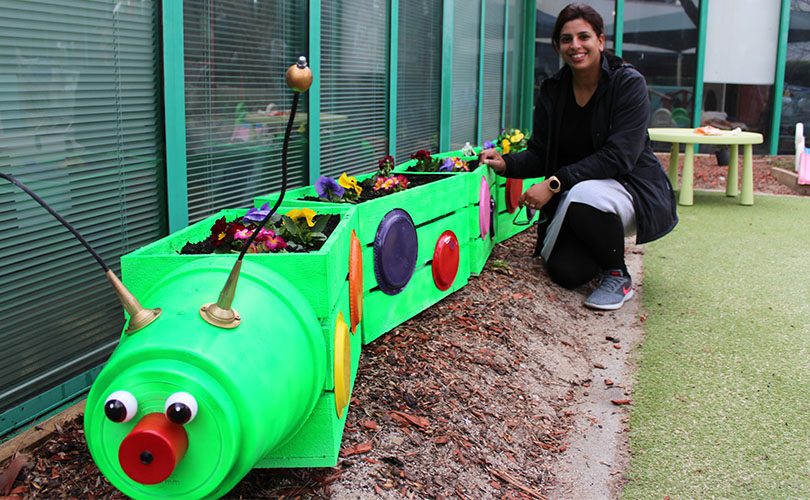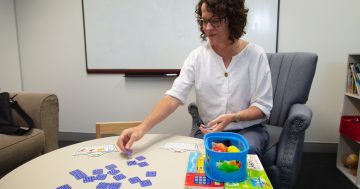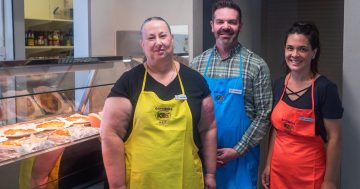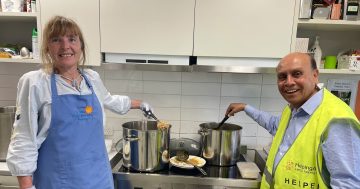
Naptime at the Lollipop Early Learning Centre. Photo: Woden Community Service.
Laura English – a specialist in child learning, a parent and subsequently a single-parent – understands the challenges and difficulties faced by young single mothers in society better than most.
“Oftentimes, the parent does not have the relevant skills or employability to gain a suitable job and provide sufficiently for the family,” she says.
“They fall into the cycle of becoming dependent on government assistance which can then also lead to varying degrees of social exclusion.”
Woden Community Service (WCS) has been helping Canberrans of all ages since 1969, and Laura is a leader in their Family Case Management team. She crosses paths with family and child poverty on a daily basis. It’s no small problem.
Laura says that in her experience, a child going through a tough time at home will typically put up three red flags.
“The main signs that I have noticed are behavioural issues which are sometimes linked to developmental delays. Children I have worked with have shown aggressive, challenging behaviours with an inability to regulate their emotions.”
They also display limited social skills and an inability to socialise well with peers. They tend to be withdrawn.
According to ACTCOSS, the number of people living below the poverty line has increased by 26 per cent during the pandemic, meaning there are approximately 9,000 children living in poverty in the ACT.
Nishi Chatley is a manager and teacher for the Lollipop Early Learning Centre (ELC) at WCS and says the signs of poverty may show up when a family is unable to pay the fees or provide lunch for the child, but a key warning sign is if the child is constantly tired, shows persistent hunger and struggles to pay attention.
“This is especially prevalent around the current pandemic when families are finding it hard to find a job or even struggling to keep their current job,” Nishi says.

Woden Community Service has run youth basketball initiatives in recent months. Photo: Woden Community Service.
What muddies the waters is that these signs are not only seen in children who experience poverty but also those who have been directly or indirectly exposed to trauma such as family violence, conflict, abuse, or neglect. These factors can affect a child’s ability to learn, socialise, and develop at school.
“Most children I have experience with are significantly delayed developmentally,” Nishi says. “Most are struggling at the ELC and have difficulty building and maintaining relationships with peers. Some also tend to lash out at teachers or figures of authority or, in contrast, disengage with the ELC entirely.”
It’s definitely a problem, but the fix is far from simple. Shame and stigma around poverty prevent many families from acknowledging it as an issue and therefore seeking help.
With so many factors possibly at play in the home, Laura says the main hurdle to combating it is finding ways to engage with the family when other social workers are already engaging with them about other issues.
“In many cases, there are multiple other factors at play, including conflict, drug/alcohol abuse, and mental health issues. It can sometimes be difficult to have a consistent approach when many stakeholders are involved, but the parents only want to engage with certain ones.”

WCS Lollipop Centre manager Nishi Chatley admires the caterpillar made and donated by the South Canberra Veterans Men’s Shed. Photo: Woden Community Service.
Both Laura and Nishi see early intervention as key. Recognising the children who fall below the poverty line in their early days at preschool will prevent their grades, behaviour and social life slipping.
WCS, for one, seeks to establish relationships with families that come to them from the very beginning, guide them and connect them with the agencies depending upon the circumstances.
On a ground level at the Lollipop ELC, Nishi says the children are currently creating artwork which will be sold to raise funds for their ‘Little Pantry’.
“The children will buy essential food and other items for the little pantry. This experience will help children to learn empathy towards those who are disadvantaged.”
To learn more about Woden Community Service (WCS) and its work in the community, visit their website.





















